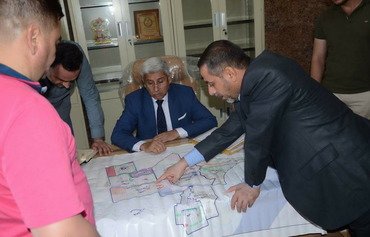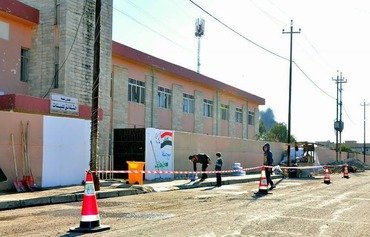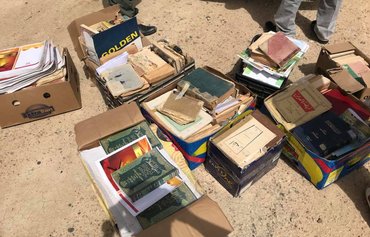Since Iraqi forces ousted the "Islamic State of Iraq and Syria" (ISIS) from the western Anbar city of Rawa on November 17th, residents have been working to remove all traces and reminders of the group's occupation.
On December 24th, the city kicked off a popular campaign to tear down all landmarks identified with ISIS and to clear the streets of all signs of fighting.
"The local administration initially invited residents to participate in the campaign to restore life to the city," Rawa mayor Hussein Ali told Diyaruna.
The rapid, large-scale response exceeded all expectations, he said.
"As soon as the invitation was issued, many citizens came to offer help, brought [heavy equipment], and started working with our teams," he said.
They have been removing all ISIS bulletins and propaganda signs plastered to walls as well as the group's flags, which had been installed on the streets and flown atop government buildings, he said.
Graffiti is being painted over, craters caused by improvised explosive devices (IEDs) are being backfilled, and streets are being cleared of rubble and residue from the fighting, Ali said.
"We want to erase all these exhibits reminding us of the dark era our city has gone through," he said.
IEDs: 'The terrorists' heaviest legacy'
Volunteers and public sector employees are working together to remove the rubble of destroyed buildings and homes in residential neighbourhoods, including Rawa al-Jadida, Rawa al-Qadima, al-Qalaa and al-Salam.
"Electricity poles have been restored to service after residents took part in erecting them and re-installing the wires," Ali said.
Members of the tribal mobilisation who have received the appropriate training have volunteered to defuse IEDs and booby-trapped houses, he said.
These remaining explosives are "the terrorists’ heaviest legacy" and pose the biggest obstacle to the return of displaced people to their homes, he said.
"We have completed defusing 13 booby-trapped houses, but there are still a lot of houses suspected of containing IEDs," he said.
"There are at least 200 houses that are likely to be booby-trapped and pose a danger to the people," said Anbar provincial council member Athal al-Fahdawi.
The campaign to rid the city of all signs of ISIS expresses the residents' "rejection and revenge on the terrorists and their desire to live in peace", and highlights their desire to contribute to the reconstruction of their city, he added.
'This is our duty'
"Erasing ISIS’s fingerprints is a good move," said Sheikh Abdullah al-Jughaifi, a tribal leader in Haditha and head of Ahrar al-Furat.
"The most prominent aspect of this popular voluntary contribution is that it shows the people's determination to turn the page on terrorism," he told Diyaruna.
People are actively involved in the efforts to clean up and rebuild their city, in a sign that a new phase of collective work and co-operation in consolidating stability has started, he said.
Key services are gradually being restored to Rawa, and the security situation there has been stable and calm, he said.
Qassim Mohammed, a Rawa resident involved in the campaign, told Diyaruna he is proud to be contributing to the efforts to remove all traces of ISIS.
"This is our duty," he said. "We got rid of the terrorists, and now we want to get rid of everything that belonged to them."
"The tragedies we have experienced with terrorism must motivate us to overcome all challenges and rebuild," he said. "The way is now paved before us to serve our city."

![Rawa's local authority is working with residents to clear the city of all traces of the 'Islamic State of Iraq and Syria'. [Photo from the Anbar Directorate of Municipalities Facebook page]](/cnmi_di/images/2018/01/09/10944-Iraq-Rawa-campaign-600_384.jpg)






